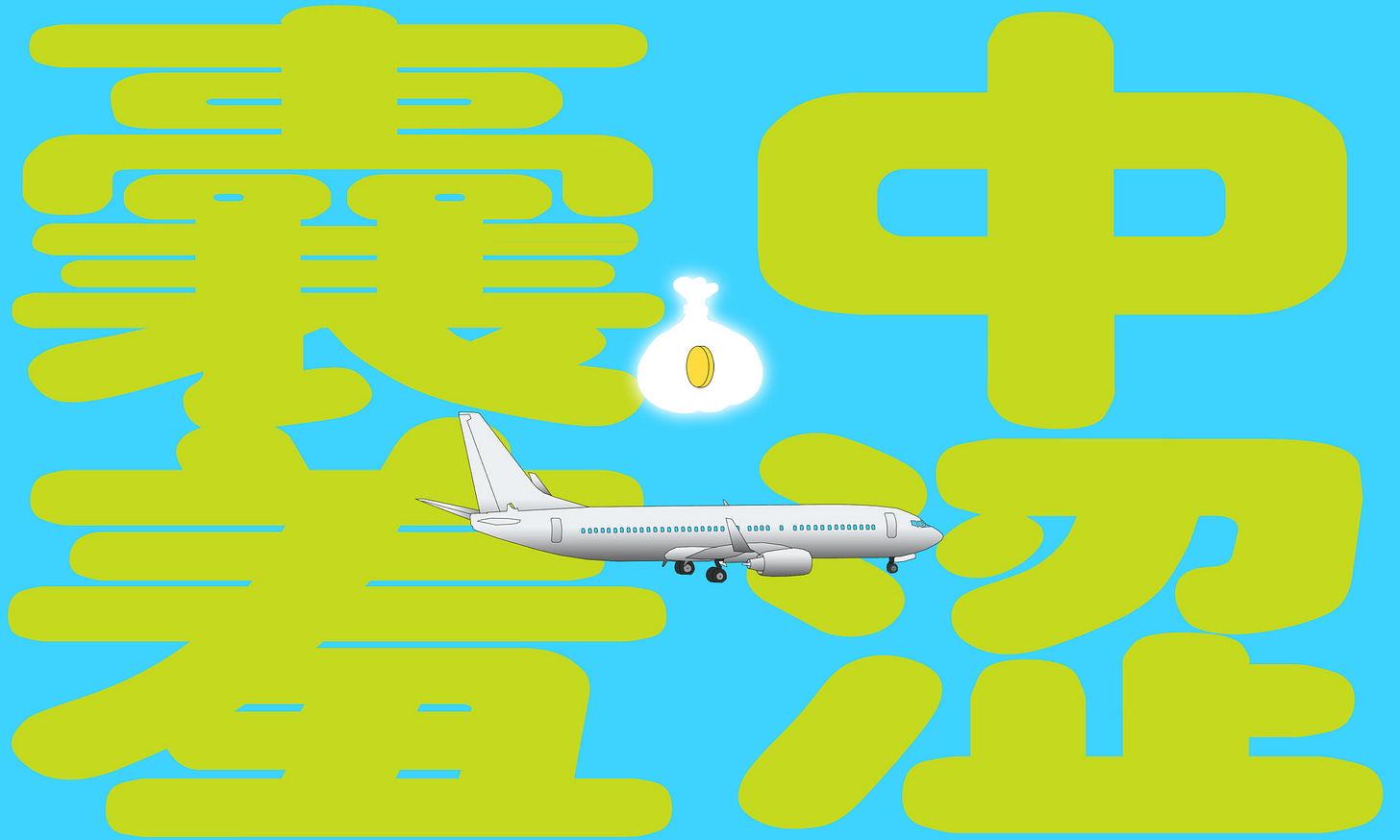"Strapped for cash" — Phrase of the Week
Budget conscious Spring Festival travellers cut costs in last-minute gamble

Our phrase of the week is: "strapped for cash" (囊中羞涩 náng zhōng xiū sè)
Context
As China’s Spring Festival travel rush—known as chunyun (春运)—approached, an unexpected phenomenon captured media attention: airfare prices on certain routes plummeted, in some cases by over 70%.
Typically in the weeks leading up to the New Year holidays, as hundreds of millions of people in China scramble to return home, flights are fully booked, priced sky-high, or completely sold out.
However, since 2023, airlines have increasingly released heavily discounted last-minute tickets on certain routes ahead of national holidays. This trend was notably seen during the lead-up to the National Day holiday in 2023, the May Day holiday in 2024, and now the Spring Festival in 2025.
The main reason behind these price drops, according to discussions in Chinese media, is said to be the overall decline in consumer spending, known as "consumption downgrading" (消费降级). With tighter budgets, many travellers opt for cheaper train journeys, or they hold out for last-minute flight deals.
As a result, airlines, often facing up to a third or even half of their seats unsold near departure on some flights, are forced to slash prices and offer promotions to attract budget-conscious passengers:
From the scarcity in 2023 to the current severe oversupply, coupled with a large number of cash-strapped consumers who have downgraded their consumption, the stage is perfectly set for budget travel during this Spring Festival.
从2023年的紧俏到如今已经严重过剩,加之人们普遍囊中羞涩消费降级,春节穷游的气氛酝酿得相当到位。
cóng 2023 nián de jǐnqiào dào rújīn yǐjīng yánzhòng guòshèng, jiāzhī rénmen pǔbiàn náng zhōng xiū sè xiāofèi jiàngjí, Chūnjié qióngyóu de qìfēn yùnniàng de xiāngdāng dàowèi.
And with that, we have our Sinica Phrase of the Week!
What it means
The idiom "cash-strapped" directly translates as "in pouch" (囊中 náng zhōng) and "embarrassed" (羞涩 xiū sè). A "pouch" (囊) can also be translated as “purse”.
This phrase originates from the Tang Dynasty poet, Du Fu 杜甫 (712–770), widely regarded as one of China’s greatest literary figures. Known for his socially conscious and realistic poetry, Du Fu vividly depicts the struggles of the poor, the hardships of war, and the moral dilemmas of his time through his poems.
Living through the An Lushan Rebellion (安史之乱 Ān Shǐ zhī Luàn, 755–763), Du Fu personally endured poverty, displacement, and witnessed the suffering of common people, which had a profound influence on his work. His poetry reflects the human cost of political and social turmoil.
The idiom first appears in Du Fu’s poem, Empty Purse (空囊 kōng náng), in the final line:
The green cypress is bitter yet edible,
The morning glow stands high, fit to be a meal.
People live recklessly in this world,
But my path is fraught with hardship.
The well water is frozen, it’s too cold to start a fire in the morning,
I have no clothes to keep myself warm at night.
I feel ashamed for my poverty, so I still keep a single coin in my purse.
翠柏苦犹食,晨霞高可餐。
世人共卤莽,吾道属艰难。
不爨井晨冻,无衣床夜寒。
囊空恐羞涩,留得一钱看。
Cuì bǎi kǔ yóu shí, chén xiá gāo kě cān.
Shì rén gòng lǔ mǎng, wú dào shǔ jiān nán.
Bù cuàn jǐng chén dòng, wú yī chuáng yè hán.
Náng kōng kǒng xiū sè, liú dé yì qián kàn.
In Empty Purse Du Fu is expressing the physical and emotional pain he experienced during the An Lushan rebellion. His depiction of the harsh beauty of nature, his own poverty, and the looming cold of autumn is a commentary on the suffering of the people, and the decline of the Tang dynasty.
In modern Chinese, the line "I feel ashamed for my poverty" (囊空恐羞涩), has been shortened to the four-character idiom, "embarrassed at having no money" (囊中羞涩). In English, this can be translated as "short on money," "financially strained," or "tight on cash."
In the context of today’s budget-conscious consumers in China, we translate it as being "strapped for cash."
Andrew Methven is the author of RealTime Mandarin, a resource to help you learn contemporary Chinese in context, and stay on top of the latest language trends in China.
Read more about how this story is being discussed in the Chinese media in this week’s RealTime Mandarin.



